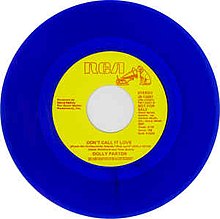| "Don't Call It Love" | ||||
|---|---|---|---|---|
 | ||||
| Single by Dolly Parton | ||||
| from the album Real Love | ||||
| B-side | "We Got Too Much" | |||
| Released | January 1985 | |||
| Genre | Country | |||
| Length | 3:13 | |||
| Label | RCA | |||
| Songwriter(s) | Tom Snow, Dean Pitchford | |||
| Producer(s) | David Malloy | |||
| Dolly Parton singles chronology | ||||
| ||||
"Don't Call It Love" is a song first released by American singer Kim Carnes on her 1981 album Mistaken Identity . The following year it was covered by Captain and Tennille and Dusty Springfield from their albums More Than Dancing and White Heat . There is also a cover version by Venezuelan artist Jorge Aguilar recorded in 1985 on his Siempre juntos album, called "Esto es amor" with adapted lyrics sung in spanish.